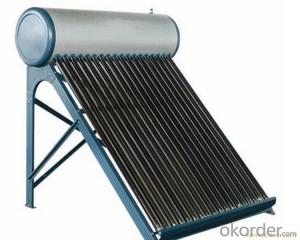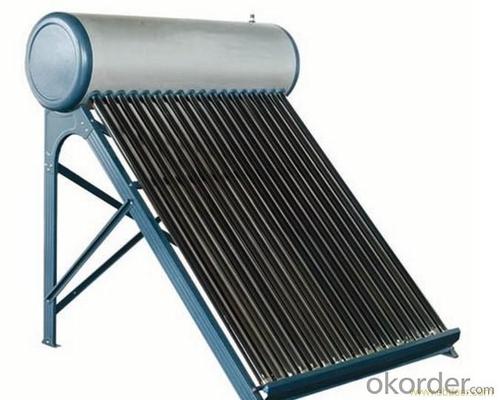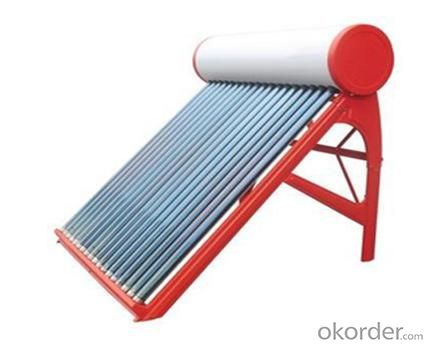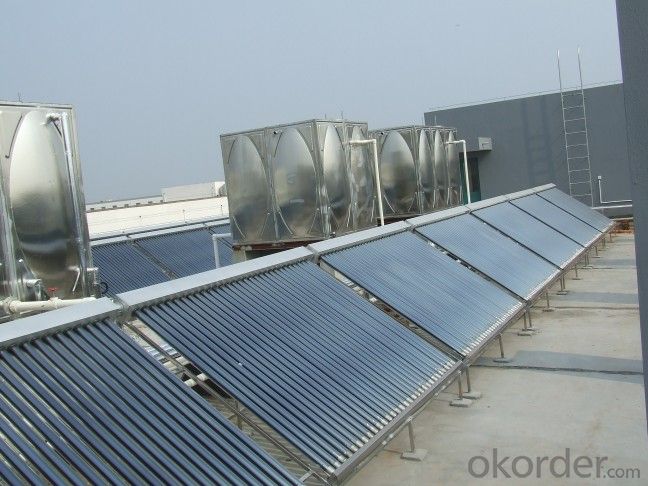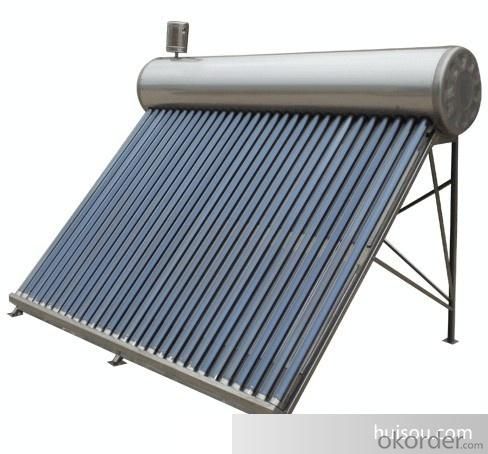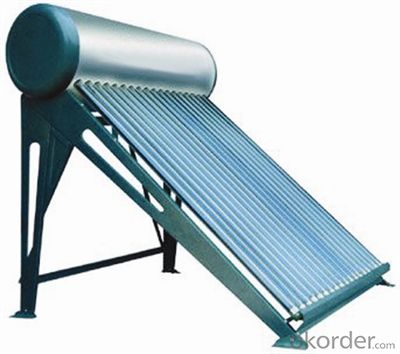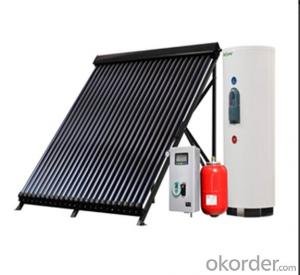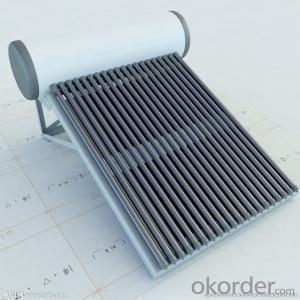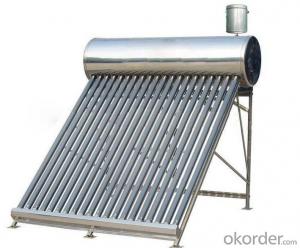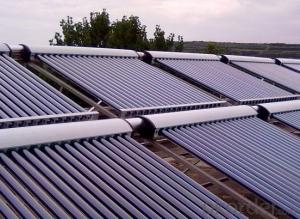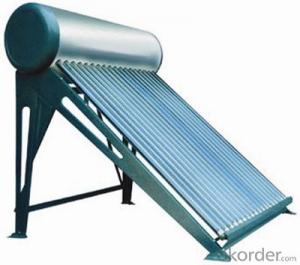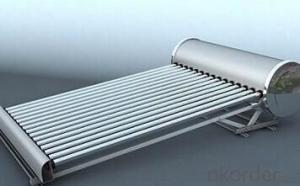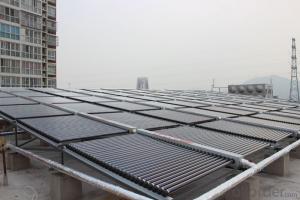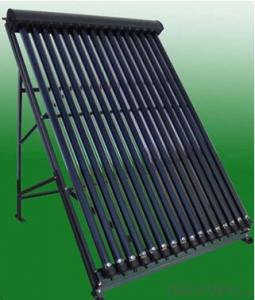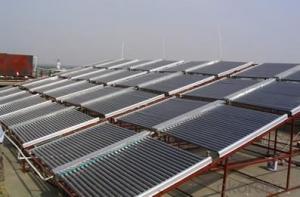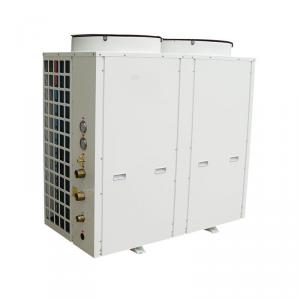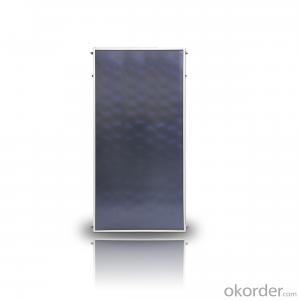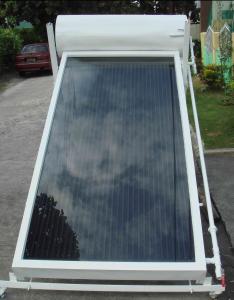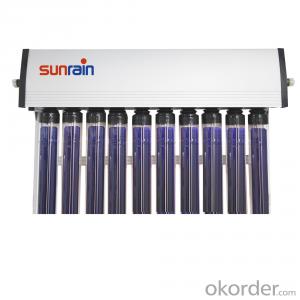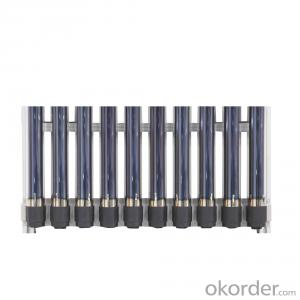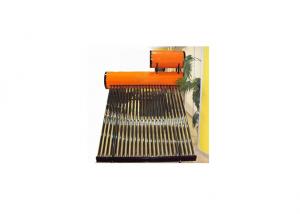150L Stainless Steel Solar Water Heater for Stock Tank
- Loading Port:
- China main port
- Payment Terms:
- TT OR LC
- Min Order Qty:
- 10 set
- Supply Capability:
- 5000 set/month
OKorder Service Pledge
OKorder Financial Service
You Might Also Like
Working Principle of Domestic Solar Water Heaters:
Solar energy, in essence, is an electromagnetic wave, a type of strong optical radiation, which is produced by thermonuclear fusion reaction. The energy of the solar radiation is transmitted through the liught of different wave length. The solar water heater is designed to mainly take in the energy of visible light & near ultra red light through the selective absorbing coating of vacuum tubes.When the water in the solar collector is heated by the solar radiation, its temperature rises. As a result, the water in the solar collector and the water in the tank form natural convection because of density contrast casued by the temperature difference. So the water of the higher temperature is incessantly forced into the insulated solar water tank( As shown in the figure).
Features
<1> Imported SUS304-2B food-level stainless steel,thickness:0.31~0.5mm
<2> Outer tank: High quality stainless steel,thickness:0.31~0.5mm
<3>Insulation: 50~55mm polyurethane foam
<4> Vacuum tube: CU/SS-AL/N red tube
<5> Frame: Stainless steel/Aluminum alloy,thickness:1.2~2mm
<6> Reflector: Stainless steel/Aluminum alloy as option
<7> Available accessories: Feeding tank,solar controller,electric heater, Mag rod,thermostatic mixing valve
Specification
ITEM.NO | SPECIFICATION | EFFECTIVE LIGHT AREA | TANK'S CAPACITY | APPLICATION PEOPLE | CBM | |||
DIAMETER OF WATER TANK | QTY OF TUBE(pcs) | DIAMETER OF TUBE | LENGTH OF TUBE | |||||
Z-NS5810 | 460mm | 10 | 58mm | 1.8m | 1.04 | 100L | 4 | 0.37 |
Z-NS5812 | 460mm | 12 | 58mm | 1.8m | 1.25 | 120L | 4-5 | 0.44 |
Z-NS5815 | 460mm | 15 | 58mm | 1.8m | 1.56 | 150L | 6 | 0.56 |
Z-NS5818 | 460mm | 18 | 58mm | 1.8m | 1.87 | 180L | 7-8 | 0.64 |
Z-NS5820 | 460mm | 20 | 58mm | 1.8m | 2.08 | 200L | 8 | 0.7 |
Z-NS5825 | 460mm | 25 | 58mm | 1.8m | 2.61 | 250L | 10 | 0.89 |
Z-NS5830 | 460mm | 30 | 58mm | 1.8m | 3.13 | 300L | 12 | 1 |
Z-NS5836 | 460mm | 36 | 58mm | 1.8m | 3.75 | 360L | 14-15 | 1.3 |
Z-NS5840 | 460mm | 40 | 58mm | 1.8m | 4.17 | 400L | 16 | 1.4 |
Z-NS5845 | 460mm | 45 | 58mm | 1.8m | 4.69 | 450L | 18 | 1.6 |
Product Details Show:
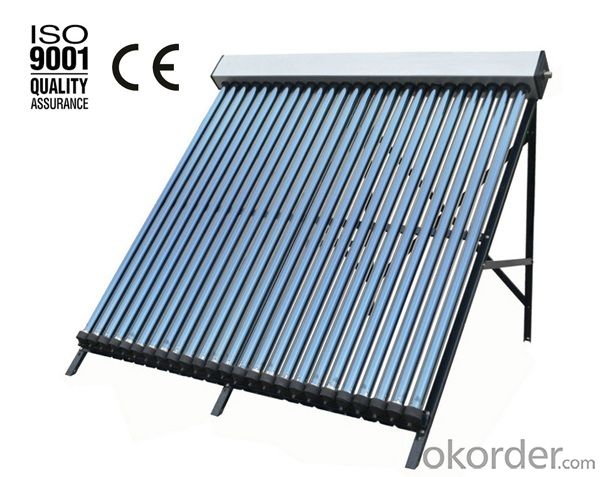
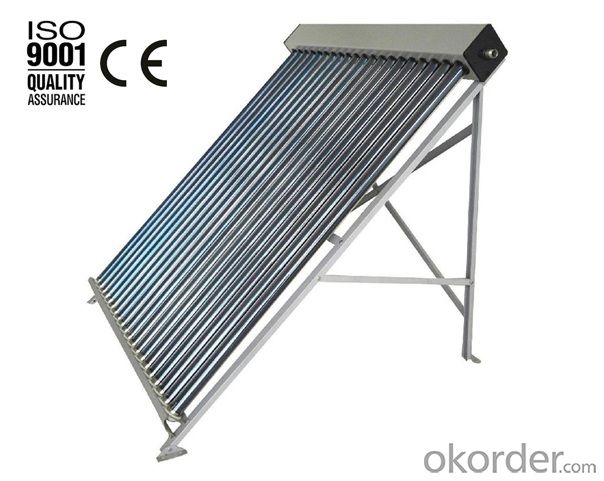
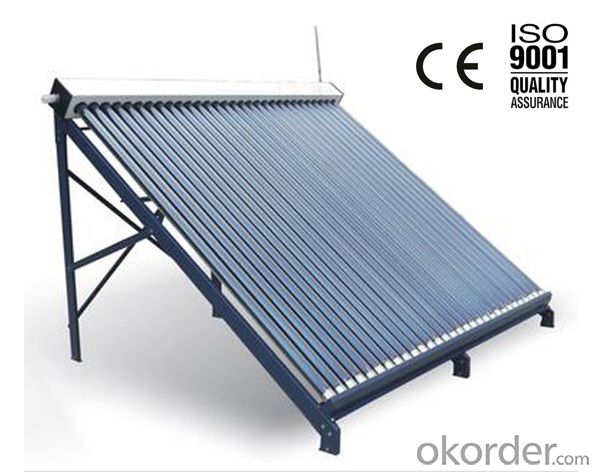
FAQ
1. Q: Are you a factory or trading company?
A: We are a factory. Especially for Solar Controller, PWM solar controller 50A12V/24V
2. Q: Where is your factory located? How can I visit there?
A: Our factory is located in Guangzhou, China. You are warmly welcomed to visit us!
3. Q: what other product you have except such Solar Lighting?
A: We have poly ,mono cells and panels. Off grid solar system, like off grid solar inverter, pure sine wave inverter, solar collector, solar controller, solar charger, Portal solar system, battery, DC Fan, Solar Led Light.
4. Q: Can the price be cheaper?
A: Of course, you will be offered a good discount for big amount.
5. How can I get a sample?
A: Please call us or send email for asking the samples.
- Q: Can a solar water heater be used in areas with limited access to energy conservation measures?
- Yes, a solar water heater can be used in areas with limited access to energy conservation measures. Solar water heaters rely on the sun's energy to heat water, making them a sustainable and cost-effective option for areas with limited access to traditional energy sources. They can be installed independently of energy conservation measures and provide a reliable and efficient way to heat water.
- Q: Solar water heater can be used for a few years!That is, long life, high temperature
- Causes of solar water heater short-livedA vacuum tube vacuum tube is the core component of solar water heater, solar water heater is the "heart". It directly determines the quality of the whole water heater performance. Vacuum tubes performance by coating technology and cleaning, coating, vacuum, sealing process of the impact. However, some ultra low-cost solar water heater using the vacuum tube has the following defects: low vacuum, only high-quality products 1/100; a large number of impurities and residual water vapor pipe, a high temperatures encountered into gas, vacuum reduction; low vacuum film stability of two or three years, intimal layer aging, fall off, resulting in the thermal performance decays rapidly, unable to absorb enough heat.
- Q: What are the common maintenance tasks for a solar water heater?
- Common maintenance tasks for a solar water heater include cleaning the solar collectors, checking for leaks or cracks in the piping, inspecting the insulation for wear and tear, ensuring proper fluid levels and pressure, and monitoring the performance of the system regularly. Additionally, it is important to inspect and clean the heat exchanger, flush out any mineral deposits, and replace any faulty components as needed.
- Q: Can a solar water heater be used in areas with acidic water?
- Yes, a solar water heater can be used in areas with acidic water. However, it is important to consider the potential effects of acidic water on the components of the solar water heater. Regular maintenance and proper water treatment may be required to prevent corrosion and ensure optimal performance of the system.
- Q: What is the difference between a passive and active solar water heater system?
- A passive solar water heater system relies on natural processes such as convection and gravity to circulate water through the system, while an active solar water heater system uses pumps or other mechanical devices to move water.
- Q: What is the expected performance of a solar water heater in areas with high levels of humidity?
- The expected performance of a solar water heater in areas with high levels of humidity may be slightly reduced compared to drier areas. High humidity can affect the efficiency of the system by reducing the rate at which water is heated. However, modern solar water heaters are designed to overcome this challenge by incorporating measures such as improved insulation and efficient heat transfer mechanisms. Therefore, while the performance may be slightly impacted, solar water heaters can still provide a significant amount of hot water in humid areas.
- Q: Advantages and disadvantages of solar water heater
- Advantages and disadvantages of solar water heater1, solar energy is not only energy efficient and save money, but also in use will not cause pollution to the environment.2, solar water heater service life is very long, if the use is reasonable, its life can be as long as 15 years.3, solar water heater temperature stability is good, as long as there is hot water tank, there will be no heat
- Q: Can a solar water heater be used to generate electricity?
- No, a solar water heater cannot be used to generate electricity. Its purpose is to heat water using sunlight, whereas solar panels are used to convert sunlight into electricity.
- Q: How does a solar water heater impact the environment?
- A solar water heater has a positive impact on the environment as it reduces the need for conventional energy sources, such as fossil fuels, to heat water. By harnessing the sun's energy, it helps to lower carbon emissions and decrease reliance on non-renewable resources, thus contributing to a greener and more sustainable future.
- Q: How does the efficiency of a solar water heater compare to an electric water heater?
- The efficiency of a solar water heater is generally higher than that of an electric water heater. Solar water heaters utilize renewable energy from the sun to heat water, which is a more sustainable and cost-effective option in the long run. On the other hand, electric water heaters rely on electricity which is often generated from non-renewable sources, resulting in higher energy consumption and associated costs. Additionally, solar water heaters can be designed to store thermal energy for use during cloudy periods, improving their overall efficiency.
Send your message to us
150L Stainless Steel Solar Water Heater for Stock Tank
- Loading Port:
- China main port
- Payment Terms:
- TT OR LC
- Min Order Qty:
- 10 set
- Supply Capability:
- 5000 set/month
OKorder Service Pledge
OKorder Financial Service
Similar products
Hot products
Hot Searches
Related keywords
